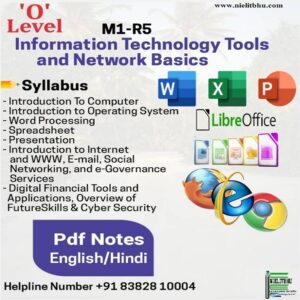Introduction to Object-Oriented Programming
- Thinking Object-Oriented
- Why Is OOP Popular? A New Paradigm, A Way of Viewing the World.
- Why Is OOP Popular? A New Paradigm, A Way of Viewing the World.
- Abstraction
- Layers of Abstraction, Other Forms of Abstraction.
- Classes and Methods
- Encapsulation, Class Definitions, Methods.
- Messages, Instances, and Initialization
- Message-Passing Syntax, Statically and Dynamically Typed Languages,
Accessing the Receiver from Within a Method, Object Creation, Pointers
and Memory Allocation, Constructors{Constant Values}, Destructors and
Finalizers.
- Message-Passing Syntax, Statically and Dynamically Typed Languages,
- Inheritance and Substitution
- An Intuitive Description of Inheritance, Inheritance in Various Languages,
[Subclass, Subtype, and Substitution], Overriding and Virtual Methods,
Interfaces and Abstract Classes, Forms of Inheritance, The Benefits of
Inheritance, The Costs of Inheritance. Examples (Language independent).
- An Intuitive Description of Inheritance, Inheritance in Various Languages,
- Static and Dynamic Behavior
- Static versus Dynamic Typing, Static and Dynamic Classes, Static versus Dynamic Method Binding.
- Multiple Inheritance (1 Hr.)
- Inheritance as Categorization, Problems Arising from Multiple Inheritance, Inner Classes.
- Polymorphism and Software Reuse (1 Hr.)
- Polymorphism in Programming Languages, Mechanisms for Software Reuse, Efficiency, and Polymorphism, Will Widespread Software Reuse Become Reality?
- Overloading and Overriding (3 Hrs.)
- Type Signatures and Scopes, Overloading Based on Scopes, Overloading Based on Type Signatures, Redefinition, Notating Overriding, Replacement versus Refinement, Deferred Methods, Overriding versus Shadowing, Covariance and Contravariance.
Introduction to Java Programming Language 32 Hrs.
- An Introduction to Java (1 Hr.)
- Java as a Programming Platform, The Java “White Paper” Buzzwords,
Java and the Internet, A Short History of Java, Common Misconceptions
About Java.
- Java as a Programming Platform, The Java “White Paper” Buzzwords,
- The Java Programming Environment (1 Hr.)
- Installing the Java Development Kit, Choosing a Development
Environment, Using the Command-Line Tools, Using an Integrated
Development Environment, Compiling and Running Programs from a Text
Editor, Running a Graphical Application, Building and Running Applets.
- Installing the Java Development Kit, Choosing a Development
- Fundamental Programming Structures in Java (2 Hrs.)
- A Simple Java Program, Comments, Data Types, Variables, Operators,
Strings, Input and Output, Control Flow, Big Numbers, Arrays.
- A Simple Java Program, Comments, Data Types, Variables, Operators,
- Objects and Classes (2 Hrs.)
- Introduction to Object-Oriented Programming, Using Predefined Classes, Defining Your Own Classes, Static Fields and Methods, Method Parameters, Object Construction, Packages, Documentation Comments, and Class Design Hints.
- Inheritance (2 Hrs.)
- Classes, Superclasses, and Subclasses, Object: The Cosmic Superclass, Generic ArrayLists, Object Wrappers, and Autoboxing, Reflection, Enumeration Classes, Design Hints for Inheritance.
- Interfaces and Inner Classes (2 Hrs.)
- Interfaces, Object Cloning, Interfaces and Callbacks, Inner Classes, Proxies.
- Introduction to GUI (2 Hrs.)
- AWT Architecture, Light-Weight vs Heavy-Weight, AWT Event Model, AWT Event Hierarchy & Event Handling, Using Top-Levels, components and Contents, Introduction to Layouts, Focus Architecture.
- Graphics Programming (4 Hrs.)
- Java2D Rendering Model, Strokes & Fills, Geometries, Fonts, and Text Layout, Transformations, Display and manipulation of Images and offscreen buffers, Using Color, Printing through Java, and Doing More with Images using Image IO, Hardware Acceleration, and Active Rendering techniques.
- User Interface Components with Swing (4 Hrs.)
- The Model-View-Controller Design Pattern, Introduction to Layout Management, Text Input, Choice Components, Menus, Sophisticated Layout Management, and Dialog Boxes.
- Deploying Applets and Applications (2 Hrs.)
- Applet Basics, The Applet HTML Tags and Attributes, Multimedia, The Applet Context, JAR Files, Application Packaging, Java Web Start, Storage of Application Preferences.
- Exceptions and Debugging (2 Hrs.)
- Dealing with Errors, Catching Exceptions, Tips for Using Exceptions, Logging, Using Assertions, Debugging Techniques, and Using a Debugger.
- Streams and Files (3 Hrs.)
- The Complete Stream Zoo, ZIP File Streams, Use of Streams, Object Streams, File Management, New I/O, Regular Expressions.
- Database Programming (5 Hrs.)
- The Design of JDBC, The Structured Query Language, JDBC Installation, Basic JDBC Programming Concepts, Query Execution, Scrollable and Updatable Result Sets, Metadata, Row Sets, Transactions, Advanced Connection Management, and Introduction to LDAP.
Introduction to UML 14 Hrs.
- Introduction, An outline Development Process and Use cases (2 Hrs.)
- What Is the UML?, How We Got Here, Notations and Meta-Models, Why Do Analysis and Design?, Overview of the Process, Inception, Elaboration, Planning the Construction Phase, Construction, Transition, When to Use Iterative Development, Use Case Diagrams, Business, and System Use Cases When to Use Cases.
- Class Diagrams and Advance Concepts (4 Hrs.)
- Perspectives, Associations, Attributes, Operations, Generalization, Constraint Rules, When to Use Class Diagrams, Stereotypes, Object Diagram, Class Scope Operations, and Attributes, Multiple and Dynamic
Classification, Aggregation, and Composition Derived Associations and Attributes, Interfaces and Abstract Classes, Reference Objects and Value Objects, Collections for Multivalued Association Ends, Frozen, Classification and Generalization, Qualified Associations, Association Class, Parameterized Class, Visibility.
- Perspectives, Associations, Attributes, Operations, Generalization, Constraint Rules, When to Use Class Diagrams, Stereotypes, Object Diagram, Class Scope Operations, and Attributes, Multiple and Dynamic
- Interaction Diagrams, Packages, and Collaborations (1 Hr.)
- Sequence Diagrams, Collaboration Diagrams, Comparing Sequence and Collaboration Diagrams, When to Use Interaction Diagrams, Packages, Collaborations, When to Use Package Diagrams and Collaborations.
- State and Activity Diagrams (1 Hr.)
- Concurrent State Diagrams, When to Use State Diagrams, Decomposing an Activity, Dynamic Concurrency, Swimlanes, When to Use Activity Diagrams.
- Physical Diagrams (1 Hr.)
- Deployment Diagrams, Component Diagrams, Combining Component and Deployment Diagrams, When to Use Physical Diagrams.





Reviews
There are no reviews yet.